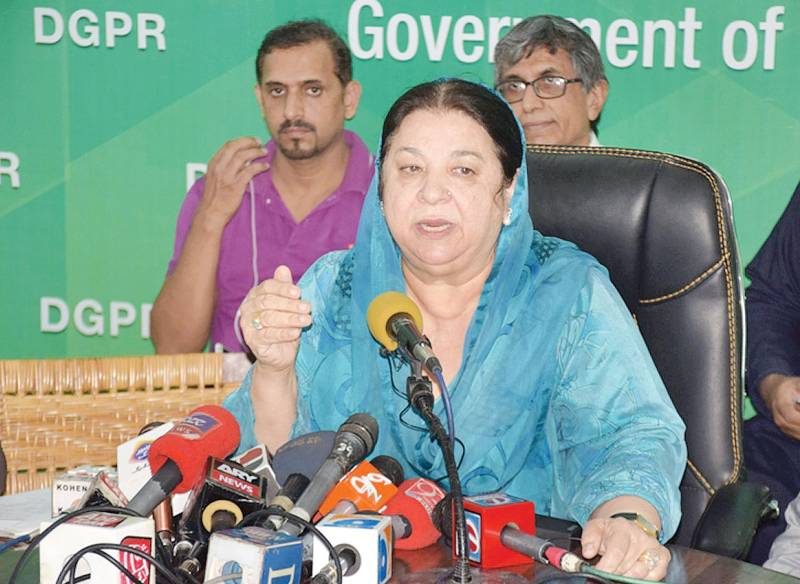LAHORE - Provincial Health Minister Dr Yasmin Rashid has clarified that no medical institution will be privatised.
Addressing a press conference at DGPR on Tuesday, she said some elements were misguiding healthcare providers and adding to the woes of ailing humanity by going on strike at public sector hospitals. Secretary Specialized Healthcare & Medical Education Mian Shakeel and Director General Public Relations Dr Muhammad Aslam Dogar were also present.
Dr Yasmin Rashid said that Medical Teaching Institutions Act would help improving standard of education at medical institutions. She said that 16,000 complaints and inquiries were pending with the department. She said the legislation would help addressing the issues of 300,000 employees of Health Department at their doorsteps.
She said that the institutions would be given administrative and financial powers through this act so that problems of employees and patients could be solved at the earliest. She said that the act would be implemented in five teaching hospitals in the first phase and third-party evaluation would be carried out after one year. This act would not create any problem for any professor or doctor, she said. “Islam teaches us to create ease for others. Young doctors should call off strike keeping in view the sanctity of holy month of Ramazan”, she said.
To a question, she said that the purpose of MTI Act was to facilitate the patients by enhancing standard and giving administrative and financial autonomy to teaching hospitals. “Administrative affairs will be managed by Board of Governors. Senior professors and doctors will remain available round the clock”, she said, adding, viable suggestions and recommendations of all the stakeholders had been accommodated in the act.
Webinar on advancement in blood clot management
Internationally acclaimed specialist and researcher Prof Lord Ajay Kakkar highlighted stroke prevention and treatment of venous thromboembolic disease during the webinar simultaneously held in Karachi, Lahore and Islamabad on Tuesday.
Head of Surgery at University College London (UCL), United Kingdom and Director of the Thrombosis Research Institute, London spoke to about 250 Pakistani healthcare professionals on the subject of best practices for blood clot management in conditions such as venous thromboembolism (VTE) and atrial fibrillation (which can lead to stroke).
Participants of the webinar arranged by Bayer Pakistan included professors and leading consultants specialising in various disease areas.
VTE affects 10 million patients worldwide each year, while people with atrial fibrillation are five times more likely to experience a stroke than the average person; approximately 15 million patients annually suffer a stroke.
During the course of his career, Prof Lord Ajay Kakkar has been involved in studies which helped bring about a fundamental change in the treatment of thrombosis.
Addressing the participants, he spoke about the prevalence of thrombosis with particular focus on the transformation in blood clot management protocols during the past 10 years. The webinar marked the 10-year anniversary of a breakthrough drug, rivaroxaban, developed by Bayer, which has benefitted 45 million people in 130 countries around the globe.
Clinical study indicates that Bayer’s drug was a paradigm shifter, as it showed an 82% risk reduction in the recurrence of these conditions against conventional therapies. Prior to the introduction of rivaroxaban, patients at risk of developing blood clots had to undergo regular monitoring by doctors, and treatment which included injections, to manage their condition. With the emergence of this innovative and simple oral therapy, treatment was made easier for patients who could simply take their medication at home, and no longer needed stringent monitoring as previously required.
“Bayer is committed to addressing modern day health challenges impacting life,” said Dr Imran Ahmad Khan, MD and CEO Bayer Pakistan, in his comments regarding the event, “We strive not only to improve the lives of people with our products but also to introduce new therapies, shifting the treatment paradigm of challenging diseases.”
Friday, April 19, 2024
No medical institute to be privatised: Yasmin
Islam teaches us to create ease for others. Young doctors should call off strike keeping in view the sanctity of holy month of Ramazan Legislation to help address issues of 300,000 employees

Opposition objects to oath-taking of MNAs amid lawlessness
5:15 PM | April 19, 2024
Electioneering to end on Friday night ahead of by-polls in 21 constituencies
5:14 PM | April 19, 2024
Fawad Chaudhry granted bail in 14 cases related to May 9 violence
5:13 PM | April 19, 2024
British Army chief lauds Pakistan Army's professionalism, expertise
5:12 PM | April 19, 2024
Israeli aircraft fire missiles at Air Force assets in Iran: Report
3:52 PM | April 19, 2024
A Tense Neighbourhood
April 19, 2024
Dubai Underwater
April 19, 2024
X Debate Continues
April 19, 2024
Hepatitis Challenge
April 18, 2024
IMF Predictions
April 18, 2024
Kite tragedy
April 19, 2024
Discipline dilemma
April 19, 2024
Urgent plea
April 19, 2024
Justice denied
April 18, 2024
AI dilemmas unveiled
April 18, 2024
ePaper - Nawaiwaqt
Advertisement
Nawaiwaqt Group | Copyright © 2024





